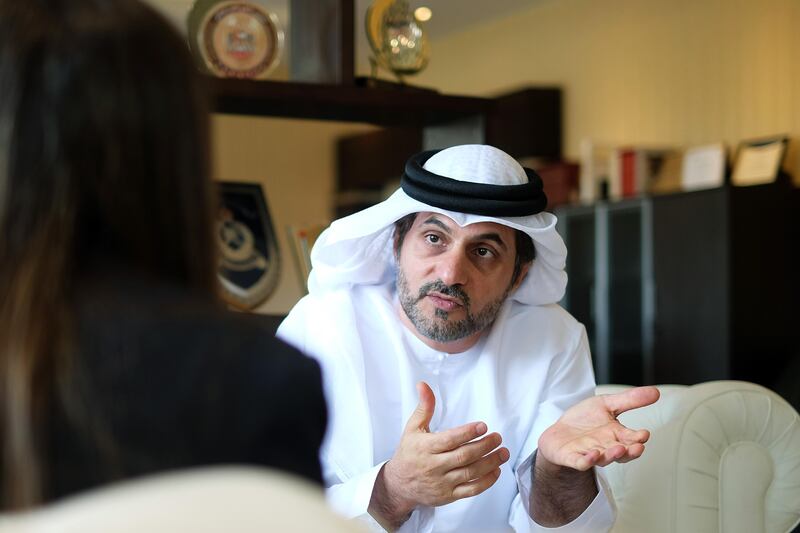Electronic alerts about a disaster will in future flash up on people’s phones as the UAE Government moves to digitalise emergency planning in a bid to save lives.
The National Emergency, Crisis and Disaster Management Authority (Ncema) said it is upgrading its systems to digitally warn residents about any potential crisis, emergency or disaster as early as possible.
The move is to keep up with evolving technologies and should be implemented by the year’s end.
“The new system issues warning messages to the public through mobile or smartphones, radio and television as well as mosque amplifiers and smart panels,” said Dr Jamal Al Hosani, director general of the authority, in an exclusive interview with The National.
“We hope it will reduce the impact of any disaster that may arise and tackle it in a fast and smooth manner. "
The system allows the authority to immediately warn those at risk to prepare or respond effectively to any kind of danger they are in, to protect themselves and their properties through smart devices. The aim is to be able to warn them digitally as early as possible of any crisis, disaster or emergency happening anywhere across the UAE.
"The work of society complements that of the authorities in emergencies," the director general said. "The public’s response to and interaction with the warnings received is a key element to ensure the effectiveness of the warnings so we hope to activate this system at country-level as it contributes to the development and prosperity of the Emirates”.
Experts say the system will save lives. “When seconds count, the UAE authorities have put into action a 21st century solution that leans forward in national emergency preparedness and response,” said Matthew Cochran, chairman of the Defence Marketing Services Council in Abu Dhabi.
Dr Suhail Sukkary, a cyber security specialist at Abu Dhabi Education Council, said technology was taking over in government services across the country. “Some people are still unaware of how technology is being used nowadays but this is a good way to start and it will be a good method in tackling hackers too,” he said.
Modern technologies have reshaped the process of communication as an increasing number of threats have stemmed from the internet and new media. UAE authorities have become increasingly alert to the threat posed by cyber attacks such as the recent WannaCry ransomware attack that affected more than 150 countries worldwide.
“New technologies are a new challenge,” Dr Al Hosani said. “They create a lot of issues for us because they bring new attacks. There are a lot of rumours going around digitally so we have to be careful of how to deal with new technologies and we must have plans to deal with them because they change on a regular basis.”
He said the rapid development of digital technologies as well as digital media and social media must be handled with caution.
“Major influencers in digital media are people so it makes a difference in dealing with such challenges," Dr Al Hosani added. "Modern technologies have changed the tools of communication and the ability to influence governments and individuals radically. There is no doubt that the new media has positive aspects but its negative aspects are undeniable, especially when it is exploited by groups that seek to promote terrorism.”
Dr Al Hosani said some groups used social media and the internet as a weapon to “spread their poison” and “lure their victims”.
Isil has been a prime example of that practice, recruiting most of its members online.
“More than 1.2 billion social media users are used as publishing, media and marketing tools, and the virtual world counts more than 81.3 million users from 22 Arab countries, hence their significant influence,” he said.
“So relying on the positive aspects of the new media to develop more effective ways for managing emergencies, crises and disasters is not impossible. The reach of social media makes it a useful tool in attracting everyone and using them to play a role in crisis management, especially that the community as a whole is the pillar of successful management of emergencies, crises and disasters and it is the first to respond within the emergency management system.”
Read more:
> Arab Spring created 'tension and increased security threats' for the UAE, emergency chief says






